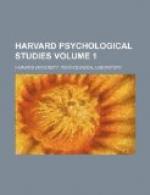The practical value of the foregoing investigation will be found in its bearing upon the acquisition of language. While it is by no means confined to the acquisition of the vocabulary of a foreign language, but is also applicable to the acquisition of the vocabulary of the native language, it is the former bearing which is perhaps more obvious. If it is important that one become able as speedily as possible to grasp the meaning of foreign words, the results of the foregoing investigation indicate the method one should adopt.
* * * * *
MUTUAL INHIBITION OF MEMORY IMAGES.
BY FREDERICK MEAKIN.
The results here presented are the record of a preliminary inquiry rather than a definitive statement of principles.
The effort to construct a satisfactory theory of inhibition has given rise, in recent years, to a good deal of discussion. Ever since it was discovered that the reflexes of the spinal cord are normally modified or restrained by the activity of the brain and Setschenow (1863) attempted to prove the existence of localized inhibition centers, the need of such a theory has been felt. The discussion, however, has been mainly physiological, and we cannot undertake to follow it here. The psychologist may not be indifferent, of course, to any comprehensive theory of nervous action. He works, indeed, under a general presumption which takes for granted a constant and definite relation between psychical and cerebral processes. But pending the settlement of the physiological question he may still continue with the study of facts to which general expression may be given under some theory of psychical inhibition not inconsistent with the findings of the physiologist.
A question of definition, however, confronts us here. Can we, it may be asked, speak of psychical inhibition at all? Does one conscious state exercise pressure on another, either to induce it, or to expel it from the field? ‘Force’ and ‘pressure,’ however pertinent to physical inquiries, are surely out of place in an investigation of the relations between the phenomena of mind. Plainly a distinction has to be made if we are to carry over the concept of inhibition from the domain of nervous activity to the conscious domain. Inhibition cannot, it should seem, have the same sense in both. We find, accordingly, that Baldwin, who defines nervous inhibition as ’interference with the normal result of a nervous excitement by an opposing force,’ says of mental inhibition that it ’exists in so far as the occurrence of a mental process prevents the simultaneous occurrence of other mental processes which might otherwise take place.’[1]
[1] Baldwin, J.M.: ‘Dictionary
of Philosophy and Psychology,’
New York and London, 1901, Vol.
I., article on ‘Inhibition.’
Even here, it may be said, there is in the term ‘prevents’ an implication of the direct exercise of force. But if we abstract from any such implication, and conceive of such force as the term inhibition seems to connote, as restricted to the associated neural or physiological processes, no unwarranted assumptions need be imported by the term into the facts, and the definition may, perhaps, suffice.




